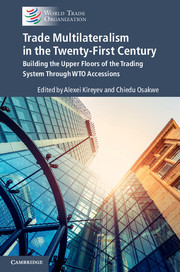 Trade Multilateralism in the Twenty-First Century
Trade Multilateralism in the Twenty-First Century from PART III - Accessions Acquis: Thematic Perspectives and Implementation Challenges
Published online by Cambridge University Press: 28 November 2017
Abstract
Obligations in accession protocols that go beyond the multilateral trade agreements are commonly referred to as ‘WTO-plus’ obligations. This chapter reviews the so-called WTO-plus obligations and argues that even though they are perceived to expand the existing obligations under multilateral trade agreements, they in fact do not create two classes of membership within the World Trade Organization (WTO). First, all accession processes are conducted on a case-by-case basis, and thus result in different obligations for each acceding government. Second, the WTO legal system is evolving continuously; therefore, to adopt new rules and advance the legal system, obligations cannot remain the same as in previous accessions. Third, non-discrimination remains one of the fundamental principles of the multilateral trading system. Accessions to WTO follow this principle and hence WTO-plus obligations have been and will continue to be set on a non-discriminatory basis. At the same time, WTO-plus obligations help upgrade the rules-based multilateral trading system. They fill gaps in the WTO rules on anti-dumping, countervailing and safeguard regimes, and they advance WTO rules by promoting plurilateral agreements.
WTO-plus obligations represent specific obligations contained in accession protocols that are perceived to expand the existing obligations under multilateral trade agreements and go beyond the existing requirements (Qin, 2016). The term ‘WTO-plus obligations’ has been widely used in the literature and addressed by trade negotiators. However, the content of such obligations is yet to be specifically and consensually defined by multilateral trade policy negotiators.
Unlike negotiations for accession to other international organizations, negotiations for accession to the WTO are open-ended. Article XII of the Marrakesh Agreement Establishing the World Trade Organization (WTO Agreement) does not put any limit on the ‘terms to be agreed’ between acceding governments and WTO members, including obligations the acceding governments shall undertake. All members that joined the WTO through accession, in contrast to those General Agreement on Tariffs and Trade (GATT) contracting parties which automatically became members of the WTO upon its creation in 1995, negotiated their terms and conditions of membership on a case-by-case basis, using the national legislation of each applicant as the starting point.
To save this book to your Kindle, first ensure [email protected] is added to your Approved Personal Document E-mail List under your Personal Document Settings on the Manage Your Content and Devices page of your Amazon account. Then enter the ‘name’ part of your Kindle email address below. Find out more about saving to your Kindle.
Note you can select to save to either the @free.kindle.com or @kindle.com variations. ‘@free.kindle.com’ emails are free but can only be saved to your device when it is connected to wi-fi. ‘@kindle.com’ emails can be delivered even when you are not connected to wi-fi, but note that service fees apply.
Find out more about the Kindle Personal Document Service.
To save content items to your account, please confirm that you agree to abide by our usage policies. If this is the first time you use this feature, you will be asked to authorise Cambridge Core to connect with your account. Find out more about saving content to Dropbox.
To save content items to your account, please confirm that you agree to abide by our usage policies. If this is the first time you use this feature, you will be asked to authorise Cambridge Core to connect with your account. Find out more about saving content to Google Drive.